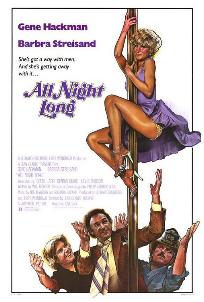Plot
George Dupler, a married man nearing middle age, is demoted after a temper tantrum at work and throwing a chair out of his boss Ralph Shuster's window) and reduced to working as the midnight-shift manager of an all-night pharmacy/convenience store.
George's 18-year-old son, Freddie, is having an affair with Cheryl Gibbons, an older, married woman, who also happens to be Freddie's fourth cousin. George advises Freddie to stop the affair before it leads to any trouble, but Freddie declares that he might love her. One night at the store, George finally meets Cheryl, an untalented singer-songwriter married to volatile firefighter Bobby and she begins to show an interest in him. After a while, the interest is mutual.
George goes to Cheryl's house to return her cigarette lighter. She offers to show George the paint job Freddie has done in her bedroom. George and Cheryl are about to get intimate, when Freddie comes over to see Cheryl for another tryst. George escapes before Freddie can see him, but Cheryl decides to tell Freddie about the affair she is having with his dad. The next day, when George is trying to sleep, and his wife, Helen, is having a French class, Freddie confronts his father, trying to fight him. Helen hears about the affair and George leaves. When she demands a divorce, George agrees.
George ends up quitting his job and leasing a loft where he can pursue his dream of being an inventor. George goes to an anniversary party where everybody he knows is there, including his family, plus Cheryl and Bobby. He realizes Bobby is aware of the affair with his wife. George takes Cheryl away from the party and her husband. Even though Cheryl loves him, she thinks he is too good for her.
Cheryl goes to the fire station where Bobby works to talk to him. Bobby ends up yelling at her and is about to hit her when the fire alarm goes off. He and all of the firemen leave, whereupon we see that it was George who reported the nonexistent fire.
Cheryl moves into George's place. Freddie has accepted the situation and helps her move in, showing that he and his dad have reconciled.
Production
The film was originally planned as a low-budget release with Gene Hackman and Lisa Eichhorn in the leading roles. Agent Sue Mengers, who was married to the film's director, Jean-Claude Tramont, suggested Barbra Streisand, her longtime client and close friend, for the part of Cheryl Gibbons instead of Eichhorn, even though filming was already under way. Streisand was paid $4 million for starring in the film, the highest salary for an actor up to that time. [3] The film's subsequent failure at the box office contributed to Streisand's decision to fire Mengers. [4] [5]
Prominent in the musical soundtrack is "La Violetera", a composition by José Padilla which had been featured previously in Charlie Chaplin's City Lights . [6]
Reception
The film received mostly negative reviews, [7] though some critics cited Streisand's performance as one of her best. On review aggregator Rotten Tomatoes, 33% of 9 reviews are positive, and the average rating is 5.4/10. [8]
Stephen Holden, in Rolling Stone magazine, gave the film a positive review, adding that Streisand's performance suggested Marilyn Monroe. Pauline Kael in The New Yorker was full of praise: "The director, Jean-Claude Tramont, a Belgian who has worked in American television, is a sophisticated jokester. There may be a suggestion of Lubitsch and of Max Ophüls in his approach, and there is more than a suggestion of Jacques Tati. Gene Hackman, whose specialty has been believable, lived-in characters, gives one of his most likable performances." [9] Gary Arnold of The Washington Post also praised Hackman's performance, calling it "the most endearing of his career, an impression of frustrated but resilient middle-class masculinity that should evoke as much recognition and rooting interest among men as women seemed to derive from Ellen Burstyn's role in Alice Doesn't Live Here Anymore ." [10]
This page is based on this
Wikipedia article Text is available under the
CC BY-SA 4.0 license; additional terms may apply.
Images, videos and audio are available under their respective licenses.
